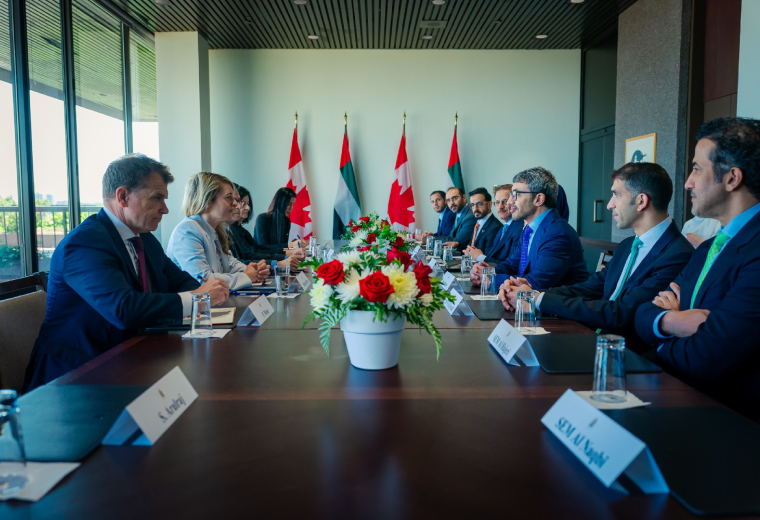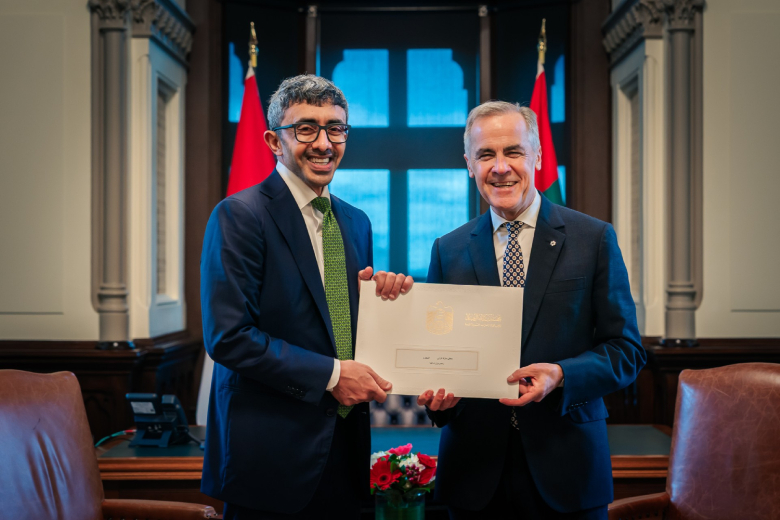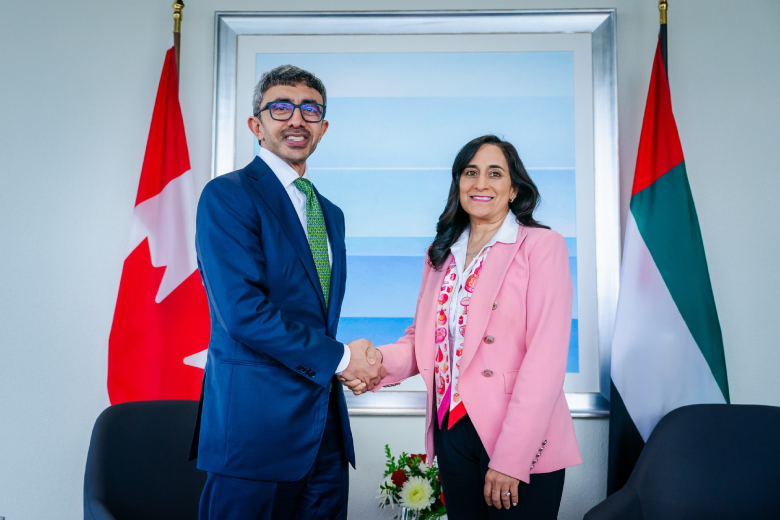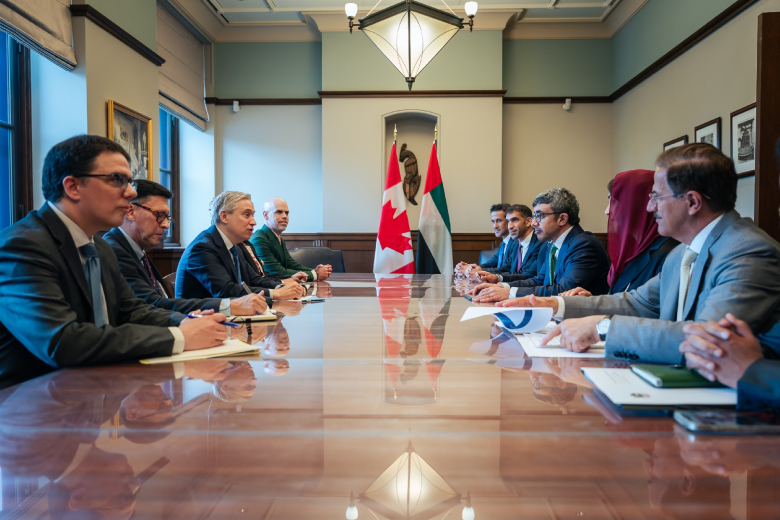Chaired by H.H. Sheikh Abdullah bin Zayed: Advisory committee for Education and Human Resources Council convenes high-level meeting to discuss post-COVID-19 agenda.

H.H. Sheikh Abdullah bin Zayed Al Nahyan, Minister of Foreign Affairs and International Cooperation and Chairman of the Education and Human Resources Council, EHRC, chaired a virtual high level meeting hosted by Council on Sunday to discuss the future of education and employment in a post COVID-19 world.
The meeting looked into the various experiences of developing education, economy and job market in the world and how to seize the opportunities from the COVID-19 crises and to make the UAE more efficient, dynamic and ready for any future challenges that may come its way.
H.H. Sheikh Abdullah bin Zayed welcomed the participants, saying that the world is going through many changes due to the outbreak of coronavirus pandemic.
"The precautionary and preventive measures taken by the UAE have become a global example of how to contain the pandemic and reflected the leadership's vision for placing people's safety and wellbeing as a top priority and for mitigating any impact on development drive across the various sectors, particularly the education," he said.
He stressed that the easing of restrictions relating to social distancing and remote working raised numerous questions, all of which need to be addressed if society is to return to a semblance of pre-outbreak normality.
"There is no doubt that the COVID-19 pandemic has reshaped societies in profound ways. It has confined us to our homes, changed the way we work and the way our children learn. However, as scientists and healthcare professionals started developing a better understanding of how to confine the pandemic, government officials are now faced with the growing socioeconomic consequences of lockdowns and are now increasingly moving towards the cautious easing of restrictions," said His Highness.
He explained, "At the same time, this next stage requires more cooperation and commitment to all measures that will ensure the efficiency of the education and economic sectors and the gradual return of work life to pre-crisis normality."
His Highness added, "A number of vital concepts have emerged that should be developed from now on in order to restore life and take advantage of the lessons learned. One of the most prominent of these is how to resume economic activities while still ensuring the safety and health of employees, and how to enhance the educational achievement of students with distance learning."
His Highness went on, "This meeting has come to mark the beginning of a new stage and to discuss the practical steps that should be taken in order to reopen our schools and the labour market again. And, most importantly, to develop an integrated vision of how to invest in opportunities that play a greater role in the adoption of flexible mechanisms that will help enhance our readiness to face any changes that may occur in the future. "
The meeting was attended by Khaldoon Al Mubarak, Chairman of Executive Affairs Authority, Abu Dhabi, and Vice Chairman of EHRC’s Advisory Panel, Sultan Saeed Al Mansouri, Minister of Economy, Hussain bin Ibrahim Al Hammadi, Minister of Education, Noura bint Mohammed Al Kaabi, Minister of Culture and Knowledge Development, Nasser bin Thani Al Hamli, Minister of Human Resources and Emiratization, Hessa bint Eissa Buhumaid, Minister of Community Development, Jameela bint Salem Al Muhairi, Minister of State for Public Education, Dr. Ahmad bin Abdullah Belhoul, Minister of State for Higher Education and Advanced Skills, and Secretary General of the EHRC, Saeed Ghobash, Chancellor of the United Arab Emirates University, Shamma bint Suhail Al Mazrui, Minister of State for Youth, Sarah bint Yousif Al Amiri, Minister of State for Advanced Sciences, Jassim Al Zaabi, Chairman of Department of Finance, Abu Dhabi, Sara Musallam, Chairperson of the Department of Education and Knowledge, Abu Dhabi, Dr. Abdulla Al Karam, Chairman of the Knowledge and Human Development Authority, Dubai, Dr. Muhadditha Al Hashimi, Chairperson of Sharjah Private Education Authority, Mohammed Al Nuaimi, Director of Educational Affairs at the Crown Prince's Court, Abu Dhabi, and 65 other leaders from the UAE government.
The Advisory Panel meeting also featured ten international advisors comprised a group of carefully curated, highly selected leaders in their field, including former Ministers, directors of global education practices, academics and experts in education and labor markets from France, Portugal, the UK, the US, Germany, Singapore and Peru, who brought their insights to the fore to predict the shape of education and employment in the age of the ‘New Normal.’ The panelists commenced their presentations with a connected overview of the education to employment journey, of which the first six participants drawn from the world of k-12 education discussing teaching and learning in a changing world, while the next two participants with extensive expertise in prestigious higher education offering and reform, and the final two as experts on labor economics and nationalization of workforce addressing the employment and economic consequences of the COVID-19 outbreak.
Cautioning about adopting advanced technology wholesale, former Minister of Culture and Minister of Education, France Jack Lang, commented, "The coronavirus has made us aware of the extent of digital tools that can help teachers. But the next world should not be the one of distance learning and the definitive grip of digital technology. Distance learning will never replace ‘face-to-face’ teaching. In higher education, some voices are already calling for a massive recourse to distance education at the beginning of the next school year. I believe that such measures could be dramatic."
Discussing indications that home-schooling in the UK during the lockdown was proving ineffective, particularly for children in lower socio-economic groups, Professor Becky Francis, CEO of the UK’s Education Endowment Fund, said: "Surveys of teachers and parents in England in 2020 show that many pupils are not engaging in high-quality home learning and that disadvantaged pupils appear to be learning less than their peers. Findings from these studies suggest that children from the most disadvantaged families are spending less time on learning activities, are submitting less work and typically have access to fewer resources at home."
Drawing attention to the operational challenges of reopening schools, Professor Tan Oon Seng, Director at Singapore’s, Centre for Research in Child Development, Nanyang Technological University, said that safety issues should always take precedence. "The priorities are to protect lives, then ensure livelihood and future readiness. Education is critical for building our young generation with resilience and future-ready capabilities. As such, there should a strong sense of continuity and positive motivation to learn, even in the face of challenges. Operational readiness needs to involve planning, implementation and monitoring to ensure maximum safety while minimising loss of learning. Health measures should include screening, testing and tracking, isolation, disinfecting of premises and physical distancing measures," he said.
Highlighting the pitfalls of the accelerated shift to new forms of learning, Professor Andreas Schleicher, Director for Education and Skills at the OECD (Organisation for Economic Co-operation and Development), remarked: "1.5 billion students - and their parents - learned over the last two months that learning with technology must work in the future. Remote learning has become the lifeline for learning, but it does not address the social functions of schools. Access, use and quality of online resources amplify inequality and accreditation is at stake. There are huge needs for just-in-time professional development and a re-prioritisation of curricula and strategies for re-opening of schools is needed. However, lots of highly innovative learning environments are emerging."
In his presentation to the co-panelists, Professor Nuno Crato, former Minister of Education and Science, Portugal, and currently President of Iniciativa Educação, highlighted what he said were failings of the online format of learning when compared to face-to-face styles of teaching. Citing statistics from the US, he said that in 2018 over a third (34.7%) of courses in the country had at least one online element and while this form of learning was sometimes positive for the best students, it was mainly negative for weaker students. For disadvantaged families, he said, online courses were doubly negative as they accentuated academic fragilities and technology challenges. He also stressed the necessary pedagogical continuity between different formats of teaching. "A good education system has to be based on a few simple principles that are common to face-to-face and to online teaching. We know it is easier said than done!" he said.
Dr. Jaime Saavedra, the Global Director of Education at the World Bank, brought to attention the impact that school closures are having on learning from around the world. According to Saavedra, "There are three key lessons of this pandemic. First, the digital divide across the world is still huge. Second, is the importance of teachers... in any new normal we will not replace teachers, but education is about the interactions within teaching and technology. And third, that education is a social experience."
Sir Michael Barber, Founder and Chairman of UK-based Delivery Associates and head of the Prime Minister’s Delivery Unit for Tony Blair’s administration, used his presentation to compare the classic model of education with various digital options, assessing the pros and cons of each. He discussed whether blended models could be the way forward and highlighted that education should always undergo change to remain relevant in the face of new realities. "The learning is the work, and the work is learning," he said.
Joining the panel from the US, Dr. John Sexton, President Emeritus of New York University, outlined the practical measures that need to be taken for Fall 2020 and the resumption of the academic year. "The comprehensive planning of options for Academic Year 2020-2021 should involve a focus on avoiding a ‘remote-as-deficit’ attitude. There should be robust communication with faculty, staff, students and parents and exercises in virtual teaching and learning for faculty staff and students. There should be the creation of interim virtual mentoring and buddy systems, additional wellness for all and academic preparedness for students programs, and special funding and technical assistance for needy students," he said.
Professor Steffen Hertog, from the UK’s London School of Economics, discussed the COVID-19 impact on GCC and UAE labor markets. Examining the issue of Emiratization in his presentation, he said that while the citizen population was relatively protected as the majority are employed in the public sector, the crisis was working against private sector Emiratization in the short- to medium-term due to private job destruction and concern over the precariousness of employment in this sector. "Further reduced public hiring will make private sector Emiratization even more important, but the slower economy will reduce the ability of the private sector to absorb Emiratis, who have higher wage expectations," he said. "There is a need for creative thinking about non-quota tools to bridge the private labor cost gap, such as negative income tax and lump sum wage subsidies. The COVID-19 fiscal impact will generally speed up ‘normalization’ of GCC labor markets, reducing gaps between public versus private sector and national versus expat wages," he conclude Finally, Philip Yeo, Chairman of Economic Development Innovations in Singapore highlighted the measures that Singaporean authorities were taking to safeguard the city state’s economy amidst the pandemic. Discussing the ‘SG United’ initiative, he revealed that Singapore was investing SGD 2 billion (AED 5.27 billion) to create 100,000 jobs, traineeships and training opportunities, with 15,000 jobs to be offered by the public sector and 25,000 by the private sector He also said that 21,000 traineeships are being offered to help local first-time jobseekers gain valuable experience in high demand areas along with 4,000 traineeships to help local jobseekers aged 40-60 gain new skills and start new careers. In addition to other support measures, Mr. Yeo said that Singapore was providing an extra SDG 800 million (AED 2.1 billion) for the COVID-19 Support Grant to continue supporting Singaporean s who have lost their jobs, been placed on no-pay leave or who face significant income loss as a result of the pandemic.
Related News

Abdullah bin Zayed meets Canadian Minister of Industry in Ottawa
H.H. Sheikh Abdullah bin Zayed Al Nahyan, Deputy Prime Minister and Minister of Foreign Affairs, met with Mélanie Joly, Minister of Industry and Minister responsible for Canada Economic Development for Quebec Regions, during his working visit to Canada.
View Details
UAE President sends written message to Canadian Prime Minister
President His Highness Sheikh Mohamed bin Zayed Al Nahyan has sent a written message to Mark Carney, Prime Minister of Canada, focusing on bilateral relations between the UAE and Canada.
View Details
Abdullah bin Zayed, Canadian Foreign Minister discuss ties, regional developments in Ottawa
H.H. Sheikh Abdullah bin Zayed Al Nahyan, Deputy Prime Minister and Minister of Foreign Affairs, met with Anita Anand, Minister of Foreign Affairs of Canada, during his working visit to the Canadian capital, Ottawa.
View Details
Abdullah bin Zayed meets Canadian Minister of Finance and National Revenue
H.H. Sheikh Abdullah bin Zayed Al Nahyan, Deputy Prime Minister and Minister of Foreign Affairs, met with François-Philippe Champagne, Canada's Minister of Finance and National Revenue, during his working visit to Ottawa.
View Details

